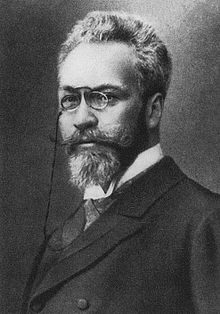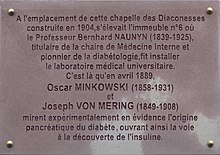Oskar Minkowski
Oskar Minkowski (born January 13, 1858 in Alexoten near Kaunas , then in the Russian government of Kovno , today in Lithuania ; † June 18, 1931 in Fürstenberg , Mecklenburg-Strelitz ) was a Lithuanian-German internist , brother of the mathematician Hermann Minkowski and father of Astrophysicist Rudolph Minkowski .
Among the outstanding achievements Minkowski the Mitentdeckung heard the importance of the pancreas ( pancreatic ) for the carbohydrate metabolism , making substantial progress in the treatment of diabetes have been made possible, and the discovery of the enlargement of the pituitary as the cause of acromegaly .
Life
Minkowski was the eldest son of a Jewish merchant family from Lithuania . His father was the grain dealer Levin Minkowski, his mother was Rachel Taubmann. In 1872 the family emigrated to Königsberg in Prussia because of anti-Jewish measures in Tsarist Russia .
Minkowski attended the Kaunas grammar school , then the old town grammar school in Königsberg and then studied human medicine in Freiburg and at the Königsberg Albertina . In the winter semester of 1875/76 he joined the Germania Königsberg fraternity , to which he belonged until his death. In 1881 he received his doctorate in medicine in Königsberg.
As early as 1884, as assistant to Bernhard Naunyn , he discovered a greatly increased concentration of β-oxy butyric acid in seriously ill diabetics . In 1888 he followed his mentor Naunyn to the University of Strasbourg , where he worked until 1904. There, together with Josef von Mering, he found out in animal experiments that the removal of the pancreas leads to the development of diabetes mellitus. In 1889, further experiments led to the realization that the pancreas had to produce a previously unknown substance that regulates the carbohydrate metabolism. He confirmed the views previously expressed by the French doctor Étienne Lancereaux on the importance of the pancreas in diabetes.
In 1894 he married Marie Johanna Siegel in Strasbourg ; the marriage produced a son and a daughter.
In 1900 Oskar Minkowski went to the newly founded Augusta Hospital in Cologne . In 1905 he came to the University of Greifswald . There he took over his first chair for internal medicine as the successor to Friedrich Moritz . Here he mainly dealt with the examination of the liver , gout and again with diabetes. In 1909 he moved to the University of Breslau , where he became one of the leading internists in Germany. During the First World War he worked as a consultant internist and as a poison gas expert. For a time he was chairman of the German Society for Internal Medicine (DGIM). From 1920 on, his students in Wroclaw included the doctor Alfred Lublin , who joined Gerhardt Katsch at the University of Greifswald in 1929 and emigrated to Bolivia in 1939 . Another student was Rudolf Stern , a close friend and doctor of Fritz Haber . In 1923 Minkowski founded the first German insulin committee. This checked the first preparations produced in Germany, such as "Insulin Hoechst " , which came onto the market at the end of 1923 .

In 1926 he retired in Wiesbaden . However, he was looking for a direct link to scientific life and planned to move to Berlin . When the move began, he lost his strength. During a stay at a spa, he died in 1931 at the age of 73 in the Fürstenberg Castle Sanatorium of the consequences of pneumonia .

Oskar Minkowski was cremated. At the request of the family, his urn and the urn of his brother Hermann Minkowski, who was first buried in Göttingen in 1909, were buried in a shared grave in the interdenominational cemetery Heerstraße in the Berlin district of Charlottenburg in today's Westend district (grave location: 3-A-30). By resolution of the Berlin Senate , the final resting place of the Minkowski brothers was dedicated in 1994 for the usual twenty-year period as an honorary grave for the State of Berlin . The non-renewal of the dedication in 2014 put the future of her grave in question.
Oskar Minkwoski's family emigrated to Argentina and the USA after the National Socialists came to power.
literature
- Heinz Schneider: Grandfather of insulin taught in Greifswald. In: Heimatkurier. Supplement to Nordkurier , August 28, 2006, p. 24
- Eberhard J. Wormer : Minkowski, Oskar. In: New German Biography (NDB). Volume 17, Duncker & Humblot, Berlin 1994, ISBN 3-428-00198-2 , p. 538 f. ( Digitized version ).
- Thomas Schlich: Minkowski, Oskar. In: Werner E. Gerabek , Bernhard D. Haage, Gundolf Keil , Wolfgang Wegner (eds.): Enzyklopädie Medizingeschichte. De Gruyter, Berlin / New York 2005, ISBN 3-11-015714-4 , p. 994.
Web links
Individual evidence
- ^ Ernst Elsheimer (ed.): Directory of the old fraternity members according to the status of the winter semester 1927/28. Frankfurt am Main 1928, p. 339.
- ↑ Thomas Schlich: Minkowski, Oskar. 2005, p. 994.
- ^ War, Violence, and the Modern Condition, 1997, By Bernd-Rüdiger Hüppauf, Bernd Hüppauf
- ^ "Explanation emergency", Wilfried Witte, 2006, Centaurus Verlag
- ^ Dietrich Stoltzenberg: Fritz Haber: Chemist, Nobel Prize Winner, German, Jew. Wiley-VCH, Weinheim, 1994, ISBN 3-527-29206-3 , p. 380.
- ^ Family obituary notice . In: Vossische Zeitung . Sunday June 21, 1931, morning edition. P. 20.
- ↑ Iris Grötschel: Grave of Hermann Minkowski in Berlin-Charlottenburg . On: Website of the Berlin Mathematical Society ( http://www.math.berlin/ ). August 2014. Accessed on November 23, 2019. Hans-Jürgen Mende : Lexicon of Berlin Burial Sites . Pharus-Plan, Berlin 2018, ISBN 978-3-86514-206-1 , p. 492.
- ↑ Template for information. Recognition and further preservation of graves of well-known and worthy personalities as honor graves of Berlin . Berlin House of Representatives, printed matter 12/4257 of April 15, 1994.
- ↑ Carolin Brühl: Not for eternity . In: Berliner Morgenpost . Sunday November 22, 2015. Retrieved November 23, 2019.
| personal data | |
|---|---|
| SURNAME | Minkowski, Oskar |
| BRIEF DESCRIPTION | German medic |
| DATE OF BIRTH | January 13, 1858 |
| PLACE OF BIRTH | Aleksotas near Kaunas |
| DATE OF DEATH | June 18, 1931 |
| Place of death | Fürstenberg on the Havel |

